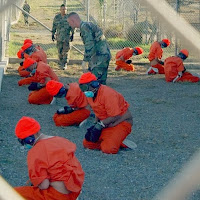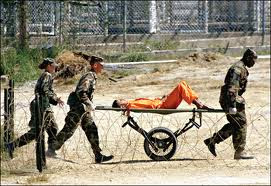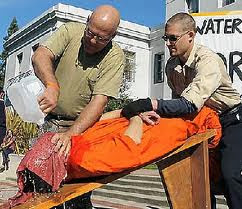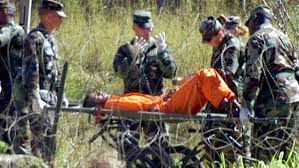When Obama was running for President, it was thought there would be a raft of changes coming, for the better. An end to war, an end to corporate greed and an end to the Patriot Act. However, after five years nothing has changed, but indeed, has worsened. Obama is now making George Bush Jr. look good, an implausible thought that would have been laughed at previously. Let's look at some of Obama's empty promises:
The Patriot Act – Obama said he would work towards repealing 'some of the worse constitutional decisions made in the last 8 years.’
Tracking Citizens - Obama said he rejected 'the tracking of citizens who do nothing more than protest a misguided war.'
Whistleblowers - Obama said that 'often the best source about waste, fraud and abuse in government is an existing government employee committed to public integrity and willing to speak out. Such acts of courage and patriotism . . . should be encouraged rather than stifled.'
Domestic Spying – Obama said he 'wouldn’t use executive power to spy on those that are not suspected of any crimes.'
Wiretapping - Obama said that he would 'review the current Administration’s warrant-less wiretapping program.'
Transparency - Obama said that his administration is 'committed to creating an unprecedented level of openness in Government.'
Extraordinary Rendition - Obama said, 'We will not ship away prisoners in the dead of night to be tortured in far off countries, or detain without trial or charge prisoners who can and should be brought to justice for their crimes, or maintain a network of secret prisons to jail people beyond the reach of the law.'
Guantanamo Bay – Obama said Gitmo would be closed because 'it’s the location of the worse constitutional abuses in recent years.’
To see the results of just one of Obama's empty promises please read this article by Jeffrey St. Clair. If we don't protest and demand the release of these men from their unlawful seizure and torture, we are complicit in the crimes against them.
Where the Torture Never Stops
Status Quo at Gitmo
By Jeffrey St. Clair • December 6, 2013
 It was shortly after five o’clock on a Saturday morning last April. The prisoners in the communal cellblock at Camp 6 in Guantanamo Bay Prison had just gathered for morning prayers. Suddenly the overhead lights went out, the cell doors slammed shut and tear gas canisters exploded in the room.
It was shortly after five o’clock on a Saturday morning last April. The prisoners in the communal cellblock at Camp 6 in Guantanamo Bay Prison had just gathered for morning prayers. Suddenly the overhead lights went out, the cell doors slammed shut and tear gas canisters exploded in the room.
Military guards charged into the cellblock, firing shotguns loaded with plastic bullets toward the huddled detainees. Three men fell to ground, writhing in pain from being struck by the “non lethal” ammunition. The other prisoners, most of whom had long been cleared for release, were forced onto the floor with guns pointed at their heads and kept prone on their bellies for the next three hours.
According to Guantanamo officials, the action was launched to quash a protest by the detainees, who had placed blankets over the surveillance cameras in their cells. But it seems more likely that the storming of the cellblock was a punitive strike against hunger striking prisoners.
 The raid came only hours after members of the International Red Cross had left the prison, following an investigation into the abusive treatment of prisoners then entering the twelfth week of a hunger strike.
The raid came only hours after members of the International Red Cross had left the prison, following an investigation into the abusive treatment of prisoners then entering the twelfth week of a hunger strike.
One of the detainees roughed up by the guards that morning was a Moroccan political dissident named Younous Chekkouri. Chekkouri has been imprisoned at Guantamo Bay since 2002. Prior to that Chekkouri had spent five months in a dreary jail in Kandahar, where he’d been swept up in the first stages of the Afghanistan war. In all that time, Chekkouri has never been charged with a crime or allowed to argue the case for his own freedom.
Chekkouri’s descent into Kafkaland began in the summer of 2001. He had been living in the suburbs of Kabul, working for a charity devoted to helping children of Moroccan descent. After the attacks of September 11, Chekkouri decided to move with his young wife back to Pakistan, where he had gone to university in Islamabad. His sent his wife out first and Chekkouri followed a few days later, but was snared at the border in the driftnet set out to detain men of Arabic descent. He was roughly interrogated by Pakistani ISI agents, who errantly identified him as a member of a Moroccan terrorist network. He was thrown into a mass prison outside Kandahar and five months later auctioned off to the CIA.
The CIA interrogated Chekkouri for several weeks in a secret prison in Afghanistan. He revealed nothing of value and the spooks soon wrote him off as human by-catch in the war on terror. Even so, the agents believed they might be able to coerce information about other Arabs in the region from him and packed Chekkouri off to Guantanamo, hoping that the terminal austerity of that prison would loosen him up.
 More interrogations followed, some more bracing than others. But it was the same story each time. Chekkouri knew about no plots and had never associated with terrorists. After a few months, the inquisitors gave up, resigned to the fact that Chekkouri was a dead end as any kind of informant. The interrogators stopped coming. But Chekkouri’s confined life remained much the same. He was subjected to arbitrary rules, fed dreadful food, awakened before dawn each morning, placed under 24-hour surveillance, denied reading material and contact with the outside world.
More interrogations followed, some more bracing than others. But it was the same story each time. Chekkouri knew about no plots and had never associated with terrorists. After a few months, the inquisitors gave up, resigned to the fact that Chekkouri was a dead end as any kind of informant. The interrogators stopped coming. But Chekkouri’s confined life remained much the same. He was subjected to arbitrary rules, fed dreadful food, awakened before dawn each morning, placed under 24-hour surveillance, denied reading material and contact with the outside world.
Year after year passes. Eventually, a military tribunal secretly cleared Chekkouri for release. Yet he remained locked up with no prospect of gaining his freedom. Indeed, he, like dozens of other detainees, was denied the right to challenge his imprisonment.
 In the spring of this year, Chekkouri joined about 100 other detainees in a hunger strike, protesting the grim, hopeless conditions in the prison. At first, the US military tried to cover up the hunger strikes. Then word began to leak out to press, followed by angry denials from Gitmo officials. The Red Cross team was dispatched to Cuba to conduct interviews with prisoners, a visit that prompted the storming of Chekkouri’s cellblock.
In the spring of this year, Chekkouri joined about 100 other detainees in a hunger strike, protesting the grim, hopeless conditions in the prison. At first, the US military tried to cover up the hunger strikes. Then word began to leak out to press, followed by angry denials from Gitmo officials. The Red Cross team was dispatched to Cuba to conduct interviews with prisoners, a visit that prompted the storming of Chekkouri’s cellblock.
 Then the government’s tactics changed. They began a brutally force-feeding regime on more than 44 of the hunger-strikers, including Chekkouri. He was placed into an execution-style chair. His legs and arms strapped down. An IV was inserted into his arm. He was kept in the chair for more than 20 hours. Later he returned to his cell. But the force-feeding continues. The guards come at night and chain him to his bed, then insert feeding tubes up his nose and down his throat, draining liquid protein into his stomach. It goes on like this day after day, week after week. A torture without end.
Then the government’s tactics changed. They began a brutally force-feeding regime on more than 44 of the hunger-strikers, including Chekkouri. He was placed into an execution-style chair. His legs and arms strapped down. An IV was inserted into his arm. He was kept in the chair for more than 20 hours. Later he returned to his cell. But the force-feeding continues. The guards come at night and chain him to his bed, then insert feeding tubes up his nose and down his throat, draining liquid protein into his stomach. It goes on like this day after day, week after week. A torture without end.
 Yet, these men have nothing to confess. They hold no secret knowledge that can be extracted by prolonged suffering. They have committed no crimes deserving of such savage punishment. Their hidden torments serve no deterrent effect. This is torture for the sake of torture, in a quadrant of the world unbound by legal or moral restraints. It is, in a word, sadism.
Yet, these men have nothing to confess. They hold no secret knowledge that can be extracted by prolonged suffering. They have committed no crimes deserving of such savage punishment. Their hidden torments serve no deterrent effect. This is torture for the sake of torture, in a quadrant of the world unbound by legal or moral restraints. It is, in a word, sadism.
A few weeks after the raid on Chekkouri’s cellblock, Obama gave a speech at the National Defense University calling for the closure of the Guantamo prison. “Gitmo has become a symbol around the world for an America that flouts the rule of law,” Obama pronounced. “Our allies won’t cooperate with us if they think a terrorist will end up at Gitmo.”
But Obama’s fatuous rhetoric is betrayed by his administration’s ruthless legal tactics against the detainees. In court filings in the force-feeding cases made only days after Obama’s speech, the Justice Department argues that indefinite detention of prisoners who have long been cleared for release is actually the goal of the administration. “The public interest,” Obama’s lawyers write, “lies with maintaining the status quo.”
In other words, one criminal act is used to perpetuate another. Thus, does sin pluck on sin.
(Reprinted from Counterpunch by permission of author or representative)
Michael Lehnert led the first Joint Task Force to Guantánamo and established the detention facility. Here's what he has to say about Guantanamo.
www.freep.com/article/20131212/OPINION05/312120025/Guantanamo-Bay-prison
Google+

2 comments:
Good democratic government: keeping the heel of the State on the neck of the voter (that is, if he can vote as he likes and get away with it).
Voting itself almost means nothing, every candidate is working for the same side - big business.
Post a Comment